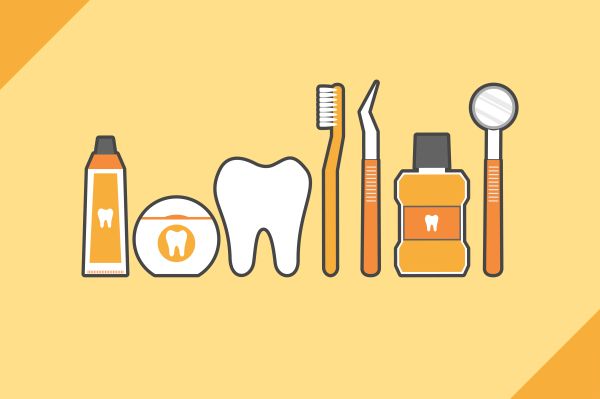Preventive Dentistry Tips: How to Floss as Much as You Should

Flossing is an important part of preventative dentistry. To maintain good dental hygiene, it is important to floss often and correctly. According to the American Dental Association, flossing helps prevent plaque buildup, which if not removed, can cause tooth decay and gum disease. But how do you floss correctly and how often is flossing needed? While you should talk with your dentist about proper oral hygiene and preventive dentistry, here are a few tips to keep in mind when adding flossing to your daily routine.
How to floss properly
In order to keep up with regular preventative dentistry without creating new dental issues, it is important to floss correctly. The U.K.’s National Health Service recommends using about 18 inches of floss. Using a gentle rocking motion, allow the floss to reach between your teeth. Avoid forcing the floss between your teeth; any snapping motions or sounds should not occur.
To clean the gum line, easily guide the floss toward the bottom of the tooth, then curve it in the shape of the letter C against the tooth. Scrape the floss along the side and front of the tooth in an upward motion to remove any plaque buildup.
Do not forget to hit all your teeth, including the ones in the back of your mouth. Maintain light pressure and slow movements throughout the process to avoid damaging your gums or teeth.
Plaque can harden into tartar in just 24 hours. Tartar is not easy to take care of and will require professional cleaning. Combined with a visit to the dentist, preventative dentistry at home will keep your teeth clean and healthy while also preventing tartar, which can later lead to serious issues like gum disease and tooth decay.
The Canadian Dental Association says to floss your teeth at least once each day to prevent plaque from hardening. It is best to floss your teeth before brushing for optimal cleanliness and plaque removal.
How to add flossing to your daily routine
Preventative dentistry should be taken seriously. Incorporate flossing into your daily routine by making a point to floss your teeth at least once a day before brushing your teeth in the morning or at night. When you floss your teeth daily, this will minimize the amount of plaque buildup and keep it from hardening on your teeth.
If you find flossing tedious, there are a few ways you can make the process easier and more entertaining. Try flossing to one of your favorite songs or perhaps while watching a television show. Just be sure to pay enough attention to what you are doing to prevent injury to your teeth or gums.
Conclusion
Preventative dentistry at home is just as important as regular visits to your dentist. By maintaining a proper flossing routine and scheduling dental appointments about every six months, you can keep your teeth healthy and your smile brighter than ever.
Request an appointment here: https://fortleefamilydental.com or call Fort Lee Family Dental at (201) 620-9772 for an appointment in our Fort Lee office.
Check out what others are saying about our services on Yelp: Read our Yelp reviews.
Recent Posts
Oral hygiene is a vital part of your preventative dental care. Achieving and maintaining good oral hygiene can be difficult, but the effort pays off in the form of healthier teeth and gums and reducing tooth decay. In this article, we'll discuss how to maintain good oral health through daily routines that help keep your…
Preventative dental care such as visiting the dentist is a huge cause of anxiety and stress in many patients. The thought of being in the examination chair and hearing the tools and possible irritation of your teeth and gums can be quite upsetting. However, going to the dentist regularly will eliminate those concerns as you…
Fluoride treatments are very important in preventative dental care. Every patient wants their dentist to provide them with all the necessary tools to keep their smile bright and white. You go to the dentist twice a year as recommended and brush and floss your teeth regularly.Doing your part in your oral care routine only goes…
Preventative dental care is important to maintaining good oral health. It would be best to make it a point to schedule your routine dental checkups twice a year. Another way to help your teeth and gums stay healthy is to brush your teeth twice a day, floss, and use mouthwash.If you are a smoker, the…


